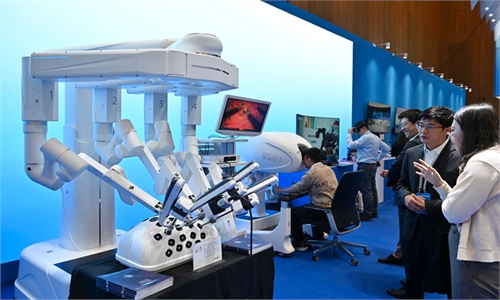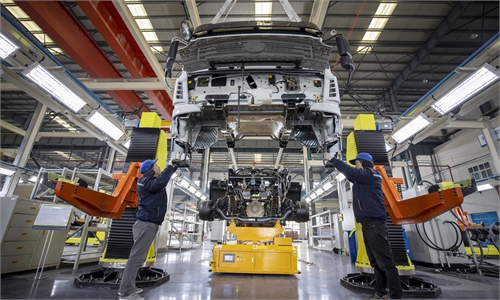
Aerial view of Shanghai Photo: VCG
China's economy has strong resilience and potential, according to experts from the Chinese Academy of Social Sciences (CASS), who emphasized the importance of investing in human capital and high-quality industrial development driven by innovation.
The ongoing technological revolution and industrial transformation present strategic opportunities for China's high-quality economic development. China's strong industrial base and huge market have provided strong momentum and demand for its high-quality development, Li Xuesong, director of the Institute of Quantitative and Technological Economics of CASS, said at a meeting organized by the China Public Diplomacy Association on Thursday.
China has a significant advantage in the size and quality of its workforce, with a large working-age population providing ample labor resources for economic growth, and the health and education levels of its labor force are continuously improving, Li explained.
With the advancement of new urbanization in the country, China is also optimizing the spatial distribution of labor and enhancing the efficiency of its labor force, he added.
China's economy has shown strong performance at the beginning of 2024, with key economic indicators surpassing expectations in the first two months. The total value-added output of major industrial enterprises increased by 7 percent compared to the same period last year, accelerating by 0.2 percentage points from December 2023.
Significant research and development investment and a highly educated workforce are driving innovation-led high-quality development in China, said Shi Dan, director of the Institute of Industrial Economics under CASS, at the meeting.
Innovation is at the core of China's industrial development, with the country's R&D expenditure reaching 2.64 percent of its GDP in 2023. China ranked 12th in the "2023 Global Innovation Index," and was the only middle-income economy in the top 30, showcasing its potential for further innovation, Shi said.
China's industries have achieved commendable progress in high-quality development, and are leading in certain areas. This development not only provides strong momentum for China's modernization goals but also offers higher-quality products and services to the international market, contributing significantly to global economic stability, Shi noted.
Li called for further macroeconomic regulation, proactive fiscal policies, and consistent macroeconomic policy orientation. He also urged increased investment in education, healthcare, and pension systems, with a shift from investing solely in industrial areas to combining industrial and human capital investment.
To foster a virtuous cycle of production and consumption, it is crucial to increase residents' income, strengthen social security, and enhance human capital and service industries. These measures are not only expected to stimulate domestic demand but also to promote high-quality population development, thus providing human resources for economic productivity, Li emphasized.
China is continuously increasing its educational expenditure to foster talent and enhance its capability for technological innovation. The Chinese Ministry of Education's budget draft for 2024 proposed a 5 percent increase in central education spending, amounting to 164.9 billion yuan ($22.9 billion).
The experts also criticized US efforts to decouple with China, comparing such actions to creating a closed system that is doomed to fail.
Shi argued that the US strategy of forcing industries to move out of China will lead to increased global production costs and decreased efficiency, ultimately harming consumers worldwide.
Past experiences have proven that China can withstand a blockade, Shi stated, stressing the need for both developing and developed nations to adopt more open economic policies.


